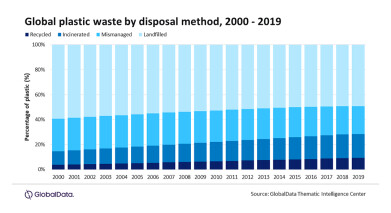Waste management
Environmental sector applauds oil and gas industry's shift toward circular economy to address plastic pollution
Jun 26 2024
The environmental industry welcomes the oil and gas sector’s growing commitment to the circular economy—emphasising the recycling, reusing, and repurposing of products to extend their lifecycle. Among the industry’s conventional products, plastic is particularly pertinent to the circular economy. The increasing demand for circular economy solutions in the oil and gas sector, especially concerning plastics, offers numerous opportunities for environmental sustainability. By investing in the production of circular polymers, companies can facilitate easier plastic recycling. Additionally, there is substantial potential to expand recycling capacities, enabling companies to meet ESG (Environmental, Social, and Governance) goals by curbing virgin plastic production, according to GlobalData, a leading data and analytics company.
GlobalData’s thematic report, “Circular Economy in Oil and Gas,” emphasises the critical need for circular economy practices in the oil and gas industry to combat plastic pollution. The report spotlights the efforts of major industry players such as ExxonMobil, Shell, and TotalEnergies in establishing a circular economy for plastic.
Ravindra Puranik, Oil and Gas Analyst at GlobalData, comments, “The proliferation of plastics in recent decades has significantly worsened plastic pollution in terrestrial and aquatic environments. As awareness of the detrimental effects of plastic use grows among consumers, many countries and enterprises are taking steps to mitigate the problem while ensuring that economic activities remain unaffected.”
Plastic is an indispensable commodity in today’s economy. However, its overuse and mismanagement at the end of its life cycle result in enormous waste and pollution, necessitating efficient recycling of plastic waste. In 2019, less than 10% of the 460 million tons of plastic waste generated was recycled.
Puranik continues, “Several economies are enacting measures to limit plastic pollution and encourage circularity. The European Union has set specific targets to reduce single-use plastic within its jurisdiction. Countries in other regions, such as Japan and Australia, have also established targets to eliminate plastic waste generation.”
The harmful effects of plastic waste and the non-renewable nature of fossil fuels used in its production have spurred efforts to achieve sustainability in plastics. This includes reducing plastic waste sent to landfills, incineration, and mismanagement. Improving plastic waste management and recycling can reduce the demand for virgin plastics introduced to the market annually.
Puranik concludes, “Companies are striving to find sustainable alternatives to minimise reliance on conventionally produced plastics. The use of bioplastics, derived from alternative feedstocks such as agricultural waste, is an emerging trend. Industry leaders like BP, Shell, and TotalEnergies have set ambitious targets for plastic recycling. Companies are pursuing methods such as mechanical recycling, chemical recycling, and bioplastic production to support their ESG commitments
Events
May 11 2025 Vienna, Austria
May 18 2025 Algiers, Algeria
23rd International Water Management Exhibition
May 20 2025 Prague, Czech Republic
Singapore International Water Week Spotlight 2025
Jun 23 2025 Singapore
Jun 25 2025 Sao Paulo, Brasil














